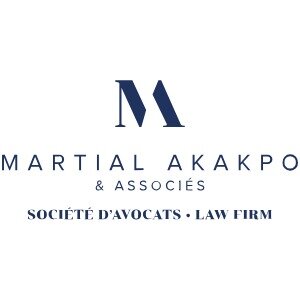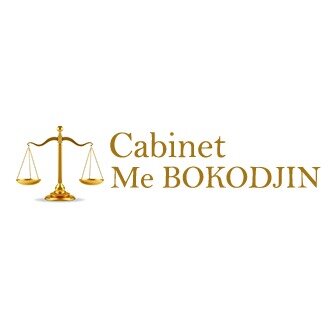Best Mortgage Lawyers in Lomé
Share your needs with us, get contacted by law firms.
Free. Takes 2 min.
Free Guide to Hiring a Real Estate Lawyer
List of the best lawyers in Lomé, Togo
About Mortgage Law in Lomé, Togo
In Lomé, Togo, mortgages are a common method for financing the purchase of real estate properties. The process involves obtaining a loan from a financial institution, where the property itself serves as collateral for the loan. Mortgage law in Togo is governed by both national legislation and regulations that pertain specifically to financial transactions and property rights. Navigating these laws can be complex and involves understanding the terms, requirements, and enforcement of mortgage agreements.
Why You May Need a Lawyer
Engaging with a lawyer for mortgage issues in Lomé, Togo, can be crucial for several reasons:
- Complex Transactions: Mortgages involve substantial financial transactions that can be legally complex, with multiple documents and legal terms to comprehend.
- Property Disputes: Disagreements can occur over property boundaries, previous claims to title, or the terms of the mortgage itself.
- Negotiating Terms: A lawyer can assist in negotiating fair terms and conditions in the mortgage agreement, ensuring that your interests are protected.
- Foreclosures: If you face foreclosure, a lawyer can guide you through your rights and potential defenses.
- Regulatory Compliance: Ensuring that all aspects of the mortgage comply with local regulations can prevent future legal issues.
Local Laws Overview
The mortgage laws in Lomé, Togo, are shaped by detailed regulatory frameworks established by the government and financial institutions. Key aspects include:
- Contractual Agreements: Mortgages must be formalized through written contracts that clearly define the terms, obligations, and rights of both parties.
- Interest Rates and Fees: There are regulations concerning the permissible interest rates and fees associated with mortgage loans to protect consumers from exploitative practices.
- Collateral Requirements: The property to be mortgaged must be clearly defined, with ownership legally recognized before it can be used as collateral.
- Foreclosure Rights: The law stipulates conditions and procedures for foreclosure, providing some level of debtor protection and defining the creditor's rights.
- Registration: Mortgages must be registered with the appropriate governmental body to be enforceable, making public the lien on the property.
Frequently Asked Questions
What is the typical duration of a mortgage in Lomé?
The most common mortgage loan term in Lomé is 15 to 30 years, though shorter terms may be available depending on the lender and borrower circumstances.
How are interest rates on mortgages determined?
Interest rates are influenced by several factors, including the central bank's policy rates, the commercial bank's lending policies, and the borrower's creditworthiness.
Can foreigners apply for a mortgage in Lomé?
Yes, foreigners can apply for a mortgage; however, they may be subject to additional requirements and higher interest rates compared to Togolese nationals.
What happens if I miss a mortgage payment?
Missing a payment can lead to penalties and, if not rectified, could eventually lead to foreclosure. It's crucial to communicate with your lender to find potential solutions if you anticipate financial difficulties.
Do I need a down payment to obtain a mortgage in Lomé?
Yes, typically a down payment is required, which can range from 10% to 20% of the property's value, depending on the lender's policies.
Can I pay off my mortgage early?
While many lenders allow early repayment, there may be penalties or fees associated with prepayment. It is advisable to understand these terms before signing the mortgage agreement.
Are there government programs to assist with obtaining a mortgage?
There are some government-backed programs and incentives that aim to help citizens obtain more affordable housing loans, particularly for first-time buyers.
How is a mortgage registered in Togo?
A mortgage must be registered with the Togolese Land Registry to be considered legally binding and enforceable. This involves filing the necessary documentation with the registry office.
What documents are typically required for a mortgage application?
Commonly required documents include proof of income, identification, credit history, the property's title deed, and a purchase agreement.
What legal protections are in place for borrowers?
The law provides several protections for borrowers, including the right to clear information about the contractual terms, the ability to negotiate terms, and certain procedures to contest a foreclosure.
Additional Resources
For those seeking additional information or assistance related to mortgages in Lomé, the following resources can be invaluable:
- Togolese Ministry of Urbanism, Housing and Living Environment: Provides information about housing policies and initiatives.
- Local Banking Institutions: Banks often offer guidance on mortgage products and services.
- Chamber of Commerce and Industry of Togo: Offers resources for both individuals and businesses involved in property transactions.
Next Steps
If you require legal assistance with a mortgage issue in Lomé, consider the following steps:
- Consult a Local Attorney: Seek out lawyers specializing in real estate or financial law for personalized legal advice.
- Gather Necessary Documentation: Assemble all relevant documents, such as existing mortgage agreements, property deeds, and financial records.
- Understand Your Rights and Obligations: Familiarize yourself with your legal rights and obligations under Togolese mortgage law.
- Contact Government Bodies: If needed, engage with local government offices for guidance on regulations and compliance.
- Stay Informed: Keep abreast of any changes in local laws that could affect your mortgage or property ownership.
Lawzana helps you find the best lawyers and law firms in Lomé through a curated and pre-screened list of qualified legal professionals. Our platform offers rankings and detailed profiles of attorneys and law firms, allowing you to compare based on practice areas, including Mortgage, experience, and client feedback.
Each profile includes a description of the firm's areas of practice, client reviews, team members and partners, year of establishment, spoken languages, office locations, contact information, social media presence, and any published articles or resources. Most firms on our platform speak English and are experienced in both local and international legal matters.
Get a quote from top-rated law firms in Lomé, Togo — quickly, securely, and without unnecessary hassle.
Disclaimer:
The information provided on this page is for general informational purposes only and does not constitute legal advice. While we strive to ensure the accuracy and relevance of the content, legal information may change over time, and interpretations of the law can vary. You should always consult with a qualified legal professional for advice specific to your situation.
We disclaim all liability for actions taken or not taken based on the content of this page. If you believe any information is incorrect or outdated, please contact us, and we will review and update it where appropriate.











